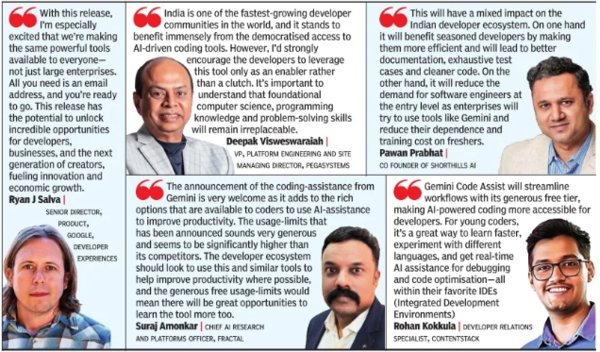In a bold move, Google has launched a new free AI-powered coding assistant designed to bring cutting-edge tools to developers everywhere. Ryan J Salva, senior director of product at Google developer experiences, unveiled the initiative, called Gemini Code Assist for individuals, with a clear mission in mind. “We’re taking all of the same tools that we’ve made available to enterprises and making them available to everyone,” he declared in an interview to us prior to the global launch of the service. “Literally, all that you need is an email address, and you’re good to go.”
This move, he argues, is about levelling the playing field, ensuring that students, hobbyists, freelancers, and small businesses—no matter their resources—can tap into the transformative power of artificial intelligence. “What gets me up every morning, what often keeps me up well late at night, is helping other people create things with software,” Salva said.
The new assistant supports all public-domain programming languages, and provides completion, generation, and chat features directly within popular development environments like Visual Studio Code and JetBrains IDEs.
One of the most striking features of Gemini Code As sist, according to Salva, is the practically unlimited usage it offers, which translates to a far higher quota than most other free coding assistants. “We set the limit way above the typical peak usage,” he said. “The idea here is that if you want to use AI-assisted tools as an engineer, as a developer, you could build a business on top of this and not have to pay a penny to Google.”
Salva said this approach was deliberately designed to make it possible for a young student or an aspiring founder to work on meaningful projects without worrying about usage caps. “You would have to use it for an insane amount of hours a day before you ever actually ran out of quota.”

For Salva, the real story lies not just in the pace at which AI is increasing development velocity, but in ensuring that software quality does not erode. “We’re seeing that use of AI historically has correlated with a regression in stability and quality,” he cautioned, pointing out how some developers, rushing to take advantage of new tools, might write more code but pay less attention to error rates or vulnerabilities. “That’s why we’ve built a code review agent with this release too,” he explained. “When you’ve written some code, it can review the code and provide feedback to you—the same kind of feedback that you would have gotten from a teammate.”
Salva gave examples of students or freelancers who, lacking a peer to review their work, could use the code re view agent for constructive pointers. “Your teammate can provide feedback like, ‘Hey, you know, you missed a spot here. You could make this a little bit tighter. This might not be compatible with the system we have over here,’” he said. “We want to offer the same for people who are working on their own.”
Boon for Indian coders
Speaking about what Google’s new offering might mean for Indian coders, Suraj Amonkar, chief AI research and platforms officer at Fractal, described the announcement of free coding assistance as “very welcome” news. “It adds to the rich options that are available to coders to use AI-assistance to improve productivity,” he said. He sounded especially enthusiastic about the generous usage limits, suggesting that they are significantly higher than its competitors and provide coders with the opportunities to learn the tool more without constantly worrying about hitting a cap.
Others were equally upbeat but more cautious about the disruption this could bring. Pawan Prabhat, cofounder of Shorthills AI, highlighted a possible downside for Indian freshers. “It will reduce the demand for software engineers at the entry level,” he said. “Enterprises will try to use tools like Gemini and reduce their dependence and training cost on freshers.” Yet Pawan also saw enormous benefits for experienced coders. “On one hand it will benefit seasoned developers by making them more efficient and will lead to better documentation, exhaustive test cases, and cleaner code.”
When presented with concerns that entry-level opportunities might fade, Google’s Salva suggested that while there is real change afoot, people should remember that the global developer community faces more work than it can handle. “I cannot tell you how many hours of my life I have wasted because I forgot to put a semicolon at the end of a line,” he said by way of illustrating how AI can handle the more tedious parts of coding. “We organise through backlogs. Every team has a 10-kilometre long list of all the things we want to create and build, but we’ve only got enough people to do the top 50. Ultimately, we’re all constrained by time and capacity, and the number of truly valuable projects is massive.”
He believes that expanding the pool of coders, rather than eliminating jobs, will enable more ambitious projects to see the light of day. “We’re going to invite more people to create software through natural language,” he insisted.
In India, that higher level of abstraction could open doors for many. “Gemini Code Assist will streamline workflows with its generous free tier, making AI-powered coding more accessible,” said R Rohan Kokkula, developer relations specialist at Contentstack. “For young coders, it’s a great way to learn faster, experiment with different languages, and get real-time AI assistance for debugging and code optimisation.”
Deepak Visweswaraiah, VP of platform engineering and site MD at Pegasystems, praised the announcement’s potential for Indian students. “They stand to benefit immensely from the democratised access to AI-driven coding tools,” he said.

